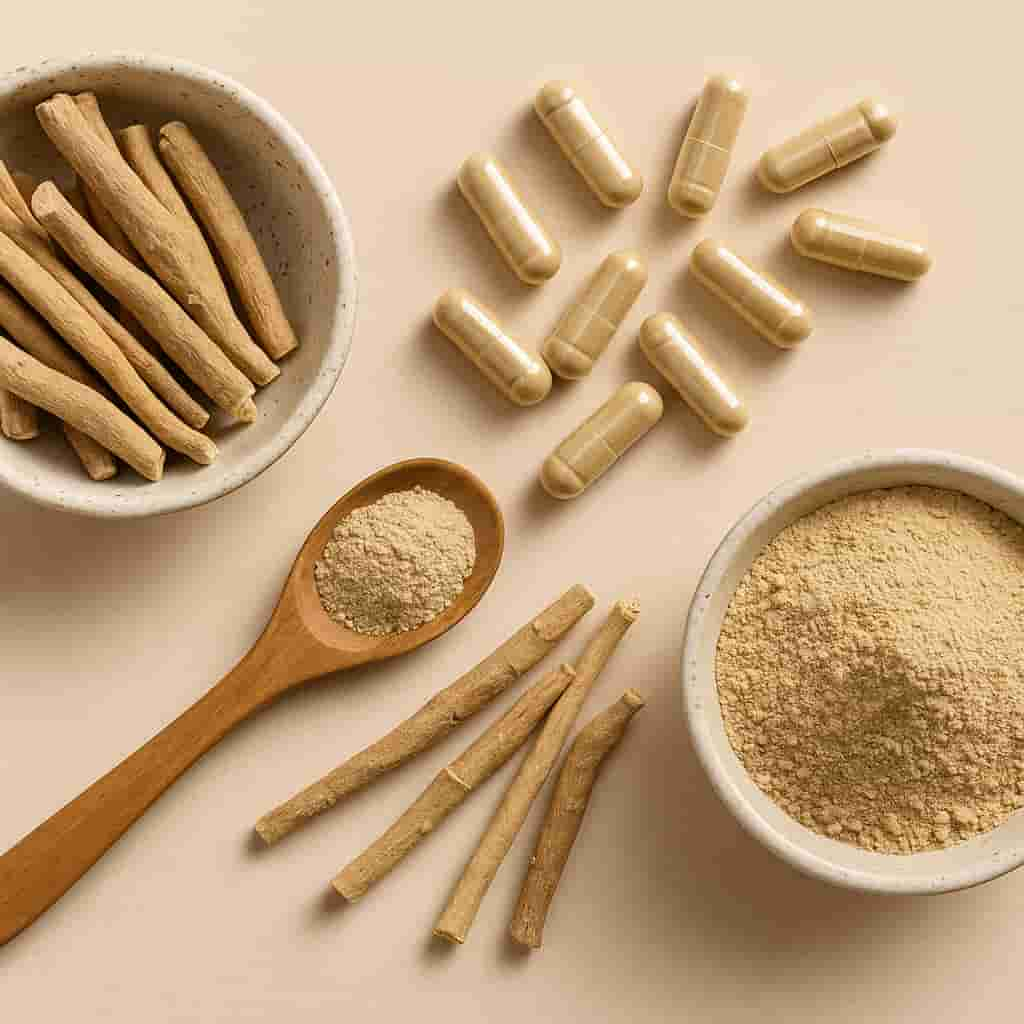
Introduction: Unlocking Ashwagandha’s Benefits – From Ancient Roots to Modern Science
Ashwagandha (Withania somnifera) isn’t just some fancy-named root—it’s a powerhouse herb that’s been boosting energy, calming minds, and probably helping ancient yogis nail their headstands for thousands of years. Fast-forward to today, and modern science is finally catching up, studying its Ashwagandha benefits like stress relief, better sleep, and even improved energy levels. But hey, before you start chugging ashwagandha tea like it’s magic potion—remember, this article is just for fun and learning! Always check with your doctor before trying new supplements, especially if you’ve got health stuff going on.
Ashwagandha’s Stress-Relief Benefits: What Clinical Research Reveals
What Science Says About Ashwagandha Benefits

So, what’s the deal with this ancient root? Well, research suggests ashwagandha might do some pretty cool things—but keep in mind, science is still figuring it all out. Here’s what some studies have observed:
✔ Helps you chill out – If stress has you wound up like a rubber band, ashwagandha might help you relax. (No, it won’t magically delete your deadlines, but hey, every bit helps!)
✔ Tames cortisol – That’s your stress hormone. Too much of it? Not great. Some studies show ashwagandha could help keep it in check.
✔ Boosts mood & well-being – Some people just feel better taking it. Placebo? Maybe. But if it works, who cares?
Important Stuff to Know
🔸 Results vary – What works for one person might do nada for another. (Life’s unfair like that.)
🔸 Quality matters – Most studies use standardized extracts (like KSM-66®), not random powder from who-knows-where.
🔸 Not a magic fix – It’s a supplement, not therapy or medicine. If you’re struggling, talk to a pro.
Typical Dose in Studies
📌 300–600 mg/day of a good-quality extract
📌 For 6–12 weeks – Patience, grasshopper. Herbs don’t work overnight.
Final thought? Ashwagandha’s promising, but it’s not a superhero. Think of it more like a helpful sidekick—useful, but not saving the day alone. 🌿
Ashwagandha’s Sleep Benefits: Emerging Evidence on This Natural Sleep Aid
Can Ashwagandha Help You Sleep? Here’s What Research Says

Ever toss and turn all night, counting sheep until you lose track? Science might have a leafy green solution. A 2019 study gave people either ashwagandha or a placebo (aka fake pills), and guess what? The ashwagandha group reported better sleep—especially when they actually tried going to bed at a decent hour. (Shocking, right?)
But before you start chugging ashwagandha tea at midnight…
✔ Not a magic sleeping pill – The FDA hasn’t approved it for sleep (or anything, really).
✔ Works best with good habits – Think less doomscrolling, more actual bedtime routine. (Yes, that means putting the phone down.)
✔ Dose matters – Studies used 125–250 mg of Sensoril® or KSM-66® extract before bed. (No, random gas station supplements don’t count.)
Bottom line? Ashwagandha might help you sleep—if you help yourself first. Now go fluff that pillow. 😴
Ashwagandha’s Energy-Boosting Benefits: How This Adaptogen Works
Ashwagandha for Energy & Stamina: Hype or Help?

Alright, let’s cut through the noise. Some smart folks in lab coats think ashwagandha might give your energy levels a nudge in the right direction. But – and this is a big but – it’s no Red Bull. Here’s what the maybe-science says:
✔ Could help your body use energy better – Like a little internal efficiency coach
✔ Might boost workout recovery – So you’re not walking like a cowboy after leg day
✔ May reduce that “always tired” feeling – Especially if you’re the active type
Cool Example: Back in 2015, cyclists taking ashwagandha daily outlasted the placebo crew. Not exactly Tour de France levels, but hey – every bit helps!
Keep It Real:
• This ain’t caffeine – don’t expect a “zoom-zoom” effect
• More like a slow burn – give it 4-6 weeks to work its magic
• Works best when you’re already trying to be healthy (sorry, couch potatoes)
Think of it like training wheels for your energy levels – helpful support, but you still gotta pedal!
Important Ashwagandha benefits Considerations: What Every User Should Know
Ashwagandha: Not for Everyone (Sorry!)
Hold up! Before you jump on the ashwagandha train, let’s talk about who should pump the brakes:
🚫 Pregnant or breastfeeding? The science isn’t clear yet, so better safe than sorry.
🚫 Autoimmune issues? This herb might stir the pot (and not in a good way).
🚫 On meds? Especially thyroid, sleep, or immune drugs – could get awkward.
“But I really want to try it!” – We hear you. Here’s how to play it smart:
✔ Buy the good stuff – Look for NSF, USP, or ConsumerLab stamps (no sketchy back-alley herbs!)
✔ Start low & slow – Like dipping toes in a pool, not cannonballing in
✔ Remember – This is a supplement, not a substitute for real medical care
Pro tip: If your doctor rolls their eyes when you mention “adaptogenic herbs,” maybe take the hint.
Your Top Ashwagandha Questions Answered: Benefits, Use & Safety FAQs
Nice try. While research shows some cool benefits, ashwagandha isn’t fairy dust. Some people feel great, others feel… exactly the same. Thanks, biology.
Hold up. Ask your doctor first—especially if you take:
✔ Thyroid meds (it might party too hard with them)
✔ Sleepy-time pills (could make you extra-zonked)
✔ Immune system drugs (awkward interactions ahead)
If it works for you? 4-8 weeks of actually taking it daily. (No, skipping doses doesn’t count.) Pro tip: Track how you feel—because “maybe it’s working?” isn’t science.
Bottom line: Ashwagandha’s potentially helpful, but it’s not stealing the show anytime soon. 🌿
Conclusion: A Research-Ashwagandha benefits
Ashwagandha: The Honest Truth (No Fluff, No Bots)
Look, we get it—everyone’s raving about ashwagandha. But here’s the real deal:
✔ Early research shows promise for stress, sleep, and energy…
✔ But it’s not a cure-all, and results vary wildly from person to person.
🚦Before You Dive In:
- Chat with your doctor—especially if you’re on meds (better safe than sorry).
- Skip the sketchy brands—stick with KSM-66® or Sensoril® (no shady “proprietary blends”).
- Give it time—4-8 weeks, minimum. This isn’t a caffeine kick.
⚠️ Heads Up:
The supplement industry is not the FDA. Just because it’s “natural” doesn’t mean it’s safe for you (see: poison ivy, rattlesnakes, etc.).
Bottom line? Ashwagandha might help… or it might just be an expensive placebo. Only one way to find out—safely. 🌿
Research-Backed Ashwagandha benefits: Scientific Studies & Trusted Sources
Science-Backed Ashwagandha Studies (Without the Boring Stuff)
Alright, let’s break down real research on ashwagandha—without putting you to sleep (unless that’s what you’re after!):
1. Stress & Anxiety Study (Chandrasekhar et al., 2012)
- What Happened? Adults took ashwagandha for 60 days.
- Results? The herb actually helped reduce stress and anxiety (way better than placebo).
- But… It was a small study—so don’t toss your therapy sessions yet.
2. Sleep & Anxiety Study (Langade et al., 2019)
- What Happened? People with insomnia took ashwagandha.
- Results? They slept better and felt less anxious. (Finally, some good news for night owls!)
- Catch? It’s not a guaranteed fix—just a possible helper.
3. Strength & Recovery Study (Ziegenfuss et al., 2018)
- What Happened? Athletes took ashwagandha while training.
- Results? They got stronger and recovered faster. (No, it’s not steroids—just a plant!)
- But… Results took weeks—so don’t expect overnight gains.
Key Takeaway?
✔ Ashwagandha might help stress, sleep, and workouts…
✔ But it’s not a magic pill—science is still figuring it out.
(P.S. If you’re still reading, congrats—you now know more about ashwagandha than 90% of people who take it!) 🌿
Legal & Medical Disclaimer
Let’s Get Serious for a Hot Second (Lawyers Made Us Do This)
Look, we love sharing cool health info—but we’re not your doctor (shocking, we know). So here’s the deal:
✔ This isn’t medical advice – Just some friendly chit-chat about herbs.
✔ Don’t sue us – If you try ashwagandha and suddenly grow wings, that’s on you (but please send pics).
✔ Talk to your actual doctor – Especially if you’re on meds or have health stuff going on. They went to school for like 10 years for this.
Remember: Just because it’s “natural” doesn’t mean it’s safe for you (poison ivy’s natural too, and nobody’s making tea out of that). 🌿
🧭 Explore More on Yoga
- 👉Holy Basil Benefits: Herb for Ayurvedic Healing.
- 👉 Garlic & Clove: Powerful Natural Remedy for Health & Immunity
- 👉Neem Oil vs. Neem Leaves: Which One is Best for You?
🔗 Love mindful living? Follow us on Pinterest and LinkedIn for daily meditation tips, peaceful visuals, and more




